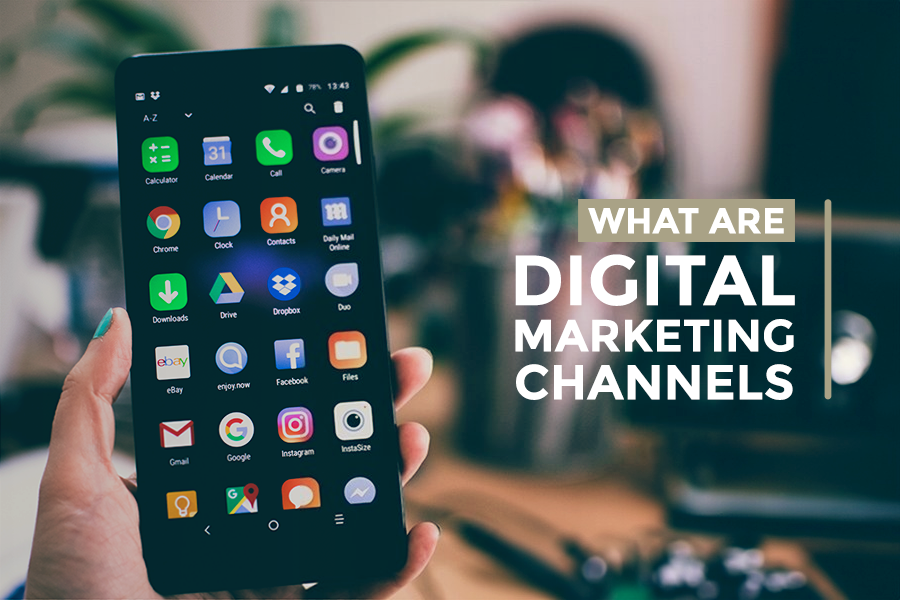Businesses need effective marketing strategies to thrive in a world driven by technology. Digital marketing has emerged as a powerful tool to connect with customers, increase brand visibility, and drive sales. Central to digital marketing are the diverse channels allowing businesses to reach their target audience efficiently.
Digital marketing channels are pivotal in promoting businesses and reaching potential customers in today’s digital age. This article will explore the various digital marketing channels, their importance, and how to choose the proper channels for your marketing strategy.
Definition of Digital Marketing
Digital marketing refers to utilizing digital platforms, tools, and strategies to advertise and promote products, services, or brands. It involves leveraging various online channels to connect with a specific target audience and engage them through various marketing techniques.
Digital marketing aims to use digital technologies effectively to improve brand awareness, increase website traffic, generate leads, and ultimately achieve business growth.
Importance of Digital Marketing
The importance of digital marketing in today’s business landscape cannot be overstated. With the rise of technology and the internet, businesses increasingly rely on digital channels to connect with their target audience and achieve their marketing goals. Here are some key reasons why digital marketing is essential for businesses:
- Cost-effectiveness: Digital marketing provides a cost-effective alternative to traditional marketing methods such as TV, radio, and print advertising. Digital platforms, such as social media, email marketing, and search engine optimization (SEO), offer various options for businesses to promote their products or services at a fraction of the cost compared to traditional advertising. This makes it accessible to businesses of all sizes, including small and medium-sized enterprises (SMEs), allowing them to compete with larger competitors on a level playing field.
- Broad audience reach: The internet has a global reach, enabling businesses to connect with a vast audience across geographical boundaries. Digital marketing allows businesses to target specific demographics, interests, and behaviors, ensuring their messages reach the right people at the right time. Through tactics like search engine marketing, social media advertising, and content marketing, businesses can extend their reach and generate brand awareness on a much larger scale than traditional marketing methods.
- Measurable results: One of the significant advantages of digital marketing is the ability to track and measure the performance of marketing campaigns in real time. Digital analytics tools provide valuable insights into website traffic, conversions, click-through rates, and customer engagement. This data allows businesses to evaluate the effectiveness of their marketing efforts, make data-driven decisions, and optimize their strategies for better results. Unlike traditional marketing, which often relies on estimates and assumptions, digital marketing provides tangible data to assess the success of a campaign.
- Personalized marketing campaigns: Digital marketing allows businesses to deliver personalized messages and experiences to their target audience. Businesses can gather information about customer preferences, behaviors, and buying patterns by leveraging data and analytics. This data enables them to create tailored marketing campaigns that resonate with individual customers, increasing the chances of conversion and customer loyalty. Personalization enhances the customer experience, builds stronger relationships, and boosts the overall effectiveness of marketing initiatives.
- Competitive advantage: Businesses that do not embrace digital marketing risk being left behind by their competitors. Consumers increasingly rely on the Internet to research products, read reviews, and make purchasing decisions. A robust digital marketing strategy helps businesses stay competitive by establishing a strong online presence, building brand credibility, and engaging with their target audience. Furthermore, digital marketing allows for agile and nimble marketing campaigns, enabling businesses to adapt quickly to market trends and customer preferences.
Types of Digital Marketing Channels

Digital marketing encompasses a wide variety of channels, tools, and strategies. The most common digital marketing channels include:
1) Search Engine Optimization (SEO):
Search Engine Optimization (SEO) is a crucial digital marketing channel that improves a website’s visibility and organic traffic on search engine result pages (SERPs).
SEO involves various strategies and techniques to optimize a website’s content, structure, and technical aspects to rank higher in search engine listings.
By optimizing a website, businesses can increase their chances of being discovered by users actively searching for relevant products or services.
To achieve effective SEO, businesses must conduct thorough keyword research to identify the terms and phrases their target audience is searching for. These keywords are strategically incorporated into the website’s content, meta tags, headings, and URLs to signal relevance to search engines.
Additionally, SEO involves optimizing the website’s technical aspects, such as improving site speed, ensuring mobile-friendliness, and optimizing the site’s structure and navigation.
2) Pay-per-Click (PPC) Advertising:
Pay-per-Click (PPC) advertising is a digital marketing channel that allows businesses to display ads on search engines, websites, or social media platforms.
Unlike traditional advertising methods, PPC advertising follows a pay-per-click model, where advertisers only pay when users click on their ad. This makes PPC an effective and cost-efficient way to drive targeted traffic to a website.
PPC campaigns are typically set up through advertising platforms such as Google Ads or Bing Ads. Advertisers bid on keywords related to their products or services, and when a user enters a search query that matches those keywords, their ads are displayed in the search results.
The placement of the ads is determined by a combination of the bid amount and the ad’s relevance to the user’s search query. By carefully selecting keywords, optimizing ad copy, and monitoring campaign performance, businesses can maximize their return on investment (ROI) and achieve their advertising goals.
3) Social Media Marketing:
Social media marketing has become an essential digital marketing channel for businesses to connect with their target audience, build brand awareness, and engage users.
Social media platforms like Facebook, Instagram, Twitter, LinkedIn, and TikTok provide businesses with a unique opportunity to create and share content, run targeted ad campaigns, and foster meaningful relationships with their customers.
A successful social media marketing strategy involves understanding the target audience and selecting the appropriate platforms to reach them. By creating compelling and shareable content, businesses can increase brand visibility and attract followers.
Social media advertising allows businesses to target specific demographics, interests, and behaviors, ensuring their ads are shown to the most relevant audience. Community management plays a crucial role in social media marketing, as it involves actively engaging with users, responding to comments and messages, and building a loyal customer base.
4) Content Marketing:
Content marketing is a strategic digital marketing channel that creates and distributes valuable, relevant, and consistent content to attract and retain a clearly defined audience.
Content marketing aims to provide value to the audience, establish the business as an authority in its industry, build trust, and ultimately drive conversions.
To implement an effective content marketing strategy, businesses must understand their target audience and needs. This helps create content that resonates with the audience and addresses their pain.
The content can take various forms, such as blog posts, articles, ebooks, infographics, videos, podcasts, and more.
The distribution of content plays a crucial role in content marketing. Identifying the appropriate channels and platforms to reach the target audience is important. This could include publishing content on the business’s website or blog, guest posting on other relevant websites, sharing content on social media, or utilizing email newsletters.
By consistently producing high-quality content and promoting it through the right channels, businesses can attract and engage their audience, driving traffic, brand awareness, and conversions.
5) Email Marketing:
Email marketing is a direct digital marketing channel that sends targeted messages to individuals who have willingly provided their email addresses. It is an effective way for businesses to nurture leads, promote products or services, and maintain customer relationships.
Businesses must build a high-quality email list to execute successful email marketing campaigns. This can be done by offering valuable incentives, such as exclusive content, discounts, or free resources, in exchange for email addresses.
Once the email list is established, businesses can segment their audience based on demographics, interests, or previous interactions to send personalized and relevant emails.
Email marketing campaigns can serve various purposes, such as welcoming new subscribers, nurturing leads through automated drip campaigns, promoting new products or services, sharing educational content, or re-engaging inactive customers.
Effective email marketing involves crafting compelling subject lines, designing visually appealing and mobile-responsive email templates, and including clear call-to-action (CTA) buttons or links.
By tracking and analyzing email campaign metrics, businesses can measure the effectiveness of their campaigns and make data-driven improvements.
6) Influencer Marketing:
Influencer marketing has recently gained significant popularity as a digital marketing channel. It leverages the popularity and influence of individuals, known as influencers, who have a large and engaged following on social media platforms.
Collaborating with influencers allows businesses to reach a wider audience, build credibility, and generate brand awareness or product endorsements.
The key to successful influencer marketing is identifying influencers whose audience aligns with the business’s target market.
This involves researching and evaluating influencers based on their niche, engagement rates, authenticity, and overall brand fit. Businesses can collaborate with influencers through sponsored content, product reviews, giveaways, or influencer takeovers.
Influencer marketing campaigns should be planned carefully, with clear objectives, target messaging, and a mutually beneficial arrangement for the business and the influencer. It is essential to establish guidelines and expectations to ensure that the content produced by influencers aligns with the brand’s values and resonates with the audience.
By leveraging the influencer’s authenticity and trust, businesses can expand their reach, gain new customers, and strengthen their brand reputation.
7) Affiliate Marketing:
Affiliate marketing is a performance-based digital marketing channel where businesses partner with affiliates to promote their products or services. Affiliates earn a commission for every sale or lead they generate through their promotional efforts.
It is mutually beneficial, as businesses can increase their reach and sales while affiliates can monetize their platforms or content.
To implement affiliate marketing, businesses must establish an affiliate program and recruit affiliates with a relevant audience aligned with the brand’s values.
Affiliates can promote products or services through various channels, such as their website, blog, social media, or email marketing. They typically utilize unique tracking links or promo codes to attribute sales or leads to their efforts.
Effective affiliate marketing involves providing affiliates with the necessary resources, such as promotional materials, product information, and tracking tools.
Regular communication and relationship building with affiliates are essential to ensure a successful partnership. By monitoring performance metrics, businesses can optimize their affiliate program, incentivize affiliates, and drive more sales or leads.
8) Mobile Marketing:
Mobile marketing focuses on reaching users on mobile devices, including smartphones and tablets. With the increasing usage of mobile devices, businesses need to optimize their marketing efforts to target mobile users effectively.
Mobile marketing includes various channels and strategies, such as SMS marketing, mobile apps, in-app advertising, and mobile-optimized websites.
SMS marketing involves sending promotional messages or updates directly to a user’s mobile phone via text messages. It can be an effective channel for delivering time-sensitive offers, reminders, or personalized communication.
Mobile apps provide businesses a direct and interactive way to engage with users through features like push notifications, in-app ads, or loyalty programs. In-app advertising allows businesses to display mobile app ads to reach a specific audience.
Mobile-optimized websites ensure users have a seamless browsing experience on their mobile devices, with responsive designs and fast loading times.
9) Video Marketing:
Video marketing is a dynamic digital marketing channel that utilizes engaging videos to convey a brand’s message, educate customers, and promote products or services. Platforms like YouTube, Facebook, Instagram, and TikTok provide an ideal space for businesses to share video content and reach a broad audience.
Video content can take various forms, such as product demonstrations, tutorials, testimonials, behind-the-scenes footage, or storytelling videos. Creating high-quality and compelling videos that capture viewers’ attention and effectively communicate the brand’s message is essential. Videos can be optimized for specific platforms, utilizing features like captions, subtitles, or interactive elements.
Video marketing can drive engagement and brand awareness and increase conversions and sales. By monitoring video analytics, businesses can gain insights into viewer behavior, demographics, and engagement metrics. This information helps in refining video content and optimizing future video marketing strategies.
10) Display Advertising:
Display advertising is a digital marketing channel that displays visual ads on websites, apps, or social media platforms. Display ads can be banners, images, videos, or interactive media designed to capture users’ attention and drive them to take action.
Display advertising allows businesses to increase brand visibility, reach a wider audience, and target specific demographics or interests. Advertisers can utilize ad networks or programmatic advertising platforms to serve display ads across various websites or platforms. Targeting options can be based on location, demographics, browsing behavior, or interests.
The success of display advertising campaigns depends on creating visually appealing ads, selecting suitable ad placements, and optimizing for click-through rates (CTRs) and conversions. Regular monitoring and optimization of campaign performance help businesses refine their targeting, ad creatives, and messaging to maximize their advertising ROI.
Benefits of Different Digital Marketing Channels
Each digital marketing channel offers unique benefits. Here are some advantages of using different channels:
- Increased Visibility and Brand Awareness: One of the primary goals of any marketing campaign is to increase brand visibility and raise awareness about products or services. Digital marketing channels provide an excellent platform for achieving this objective. With channels like search engine optimization (SEO) and content marketing, businesses can optimize their online presence to improve visibility in search engine results. This, in turn, can attract more organic traffic to their websites and increase brand recognition among potential customers.
- Targeted Reach and Audience Engagement: Digital marketing allows businesses to precisely target their marketing efforts to reach specific demographics or audiences with relevant messaging. Channels such as social media marketing and pay-per-click (PPC) advertising offer sophisticated targeting options based on age, location, interests, and behavior. By reaching the right audience, businesses can achieve higher engagement rates and maximize the impact of their marketing campaigns.
- Cost-Effectiveness and Measurable Results: Compared to traditional marketing channels like print or television advertising, digital marketing often offers more cost-effective options. With channels such as email marketing or social media advertising, businesses can reach a large audience at a fraction of the cost. Additionally, digital marketing provides detailed analytics and measurable results, allowing businesses to track the effectiveness of their campaigns in real time. This data-driven approach enables businesses to make informed decisions and optimize their marketing strategies for better outcomes.
- Personalization and Customer Relationship Management: Digital marketing channels provide opportunities for personalized marketing campaigns, which can significantly enhance customer relationships. Email marketing allows businesses to segment their subscriber lists and send targeted messages tailored to specific customer interests or behaviors. Personalization helps businesses establish a deeper connection with their audience and increases the likelihood of converting leads into customers. Furthermore, social media and live chat enable direct customer communication, fostering engagement and building stronger relationships.
- Flexibility and Adaptability: Digital marketing channels offer flexibility and adaptability, allowing businesses to quickly adjust their strategies based on changing market trends or customer preferences. With channels like social media and content marketing, businesses can rapidly create and distribute new content, responding to current events or industry developments. This agility in digital marketing enables businesses to stay relevant and maintain a competitive edge in their respective markets.
- Enhanced Data and Insights: Digital marketing channels generate vast data and insights that businesses can leverage to refine their marketing strategies. Through tools like Google Analytics or social media analytics, businesses can gain valuable information about their audience’s behavior, preferences, and conversion patterns. This data-driven approach helps businesses identify strengths and weaknesses in their campaigns, make data-backed decisions, and optimize their marketing efforts for better results.
- Integration and Cross-Channel Synergy: Digital marketing channels can be combined to create synergistic effects, amplifying the overall impact of marketing campaigns. For example, a business can use content marketing to attract organic traffic to its website and then retarget those visitors through display advertising or email marketing. By combining multiple channels strategically, businesses can create a seamless and consistent brand experience for their audience, leading to higher engagement and conversion rates.

Choosing the Right Digital Marketing Channels
Selecting the most effective digital marketing channels for your business requires careful consideration. Here are some factors to keep in mind:
Understanding Your Target Audience
One of the fundamental aspects of effective digital marketing is understanding your target audience. By gaining insights into their online behavior, preferences, and the platforms they frequent, you can tailor your marketing efforts to reach and engage with them effectively. Start by creating buyer personas that represent your ideal customers.
These personas should include demographic information, interests, pain points, and online habits. Conduct market research, analyze customer data, and leverage analytics tools to gather the necessary information. This knowledge will help you determine the channels your audience will use and the content formats that resonate with them.
For example, if your target audience consists of young professionals who are highly active on social media, platforms like Instagram, LinkedIn, or TikTok may be effective for reaching them. On the other hand, if your audience includes business executives and decision-makers, platforms like LinkedIn and industry-specific forums may be more suitable.
Evaluating Budget and Resources
When selecting digital marketing channels, evaluating your budget and available resources is essential. Some channels may require higher investments, while others may be more cost-effective for your business.
Consider the costs of creating content, running ads, hiring professionals, and managing campaigns on each platform. Paid advertising channels like Google Ads, Facebook Ads, or LinkedIn Ads can provide targeted exposure but often require a significant budget.
On the other hand, organic marketing efforts such as search engine optimization (SEO), content marketing, and social media engagement can be cost-effective. Still, they may require more time and effort to yield results. Balancing your budget and each channel’s potential return on investment (ROI) is crucial.
Setting Clear Goals and Objectives
Before deciding on digital marketing channels, you must define clear goals and objectives for your strategy. What do you want to achieve with your digital marketing efforts?
Are you aiming for brand awareness, lead generation, increased website traffic, or sales? Different channels have different strengths and weaknesses when it comes to specific objectives.
For example, if your primary goal is to increase brand awareness, channels like social media, content marketing, influencer collaborations, and display advertising can help you reach a broader audience and create brand recognition.
Conversely, if your goal is lead generation, channels like email marketing, search engine marketing (SEM), and landing page optimization may be more effective at capturing and converting leads.
Analyzing Competitor Strategies
Analyzing your competitors’ digital marketing strategies can provide valuable insights and help you identify gaps and opportunities in the market. Study their online presence, content strategies, social media engagement, advertising campaigns, and other marketing activities. By understanding what works well for your competitors, you can gain inspiration for your digital marketing efforts and identify areas where you can differentiate yourself. Pay attention to the channels they are active on, the type of content they produce, and the engagement they generate.
Look for patterns and trends that resonate with their audience. Additionally, analyze any weaknesses or missed opportunities in their strategies and try to capitalize on them with your unique approach.
Testing and Experimentation
Digital marketing is dynamic, and trends and consumer preferences change rapidly. What works today may not work as effectively tomorrow. Therefore, adopting a mindset of constant testing and experimentation is essential. Experiment with different channels, tactics, content formats, and messaging to identify the ones that yield the best results for your business.
Run A/B tests, measure key performance indicators (KPIs), and use analytics tools to gather data and insights on the performance of your marketing efforts. Continuously optimize your campaigns based on the results you obtain. This iterative process allows you to refine your strategies and allocate your resources more efficiently.
For example, if you are unsure whether to invest in video marketing or podcasting, you can simultaneously run campaigns on both channels and compare the results. Monitor metrics such as engagement, conversion rates, and audience feedback to determine which channel is more effective for your goals.
FAQs
Q1: How long does it take to see results from digital marketing efforts?
A1: The timeframe for seeing results from digital marketing can vary depending on the chosen channels, campaign strategy, and industry. Generally, it’s essential to allow sufficient data gathering and optimization time before expecting significant results.
Q2: Which digital marketing channel is the most cost-effective?
A2: The cost-effectiveness of digital marketing channels can vary depending on factors such as the target audience, industry, and specific goals. When determining cost-effectiveness, it’s essential to analyze the potential return on investment (ROI) and compare it to your budget and resources.
Q3: Can I use multiple digital marketing channels simultaneously?
A3: Absolutely! Utilizing multiple channels can be highly beneficial as it allows you to reach a wider audience and diversify your marketing efforts. However, ensuring that each channel complements the others and aligns with your overall marketing strategy is crucial.
Q4: Do I need to be active on all social media platforms?
A4: Not necessarily. It’s important to identify the social media platforms your target audience frequents the most. Focus on those platforms to maximize engagement and avoid spreading yourself too thin across multiple platforms.
Q5: How often should I evaluate and adjust my digital marketing strategy?
A5: Digital marketing is an ongoing process, and it’s crucial to regularly evaluate and adjust your strategy based on performance data and market trends. Aim for periodic reviews, typically quarterly or biannually, to ensure your strategy remains effective and aligned with your goals.
Conclusion
Digital marketing channels offer businesses unparalleled opportunities to reach their target audience and achieve their marketing goals. By understanding the various channels available and selecting the ones that align with their objectives, businesses can effectively promote their products or services, build brand awareness, and drive growth in the digital landscape.
At True North Social, we have experienced professionals that help businesses grow their presence online and maximize the impact of their digital marketing efforts. Our team can guide you through selecting channels, creating content, optimizing campaigns, and analyzing data to ensure your success in the digital space. Contact us today to learn more!


